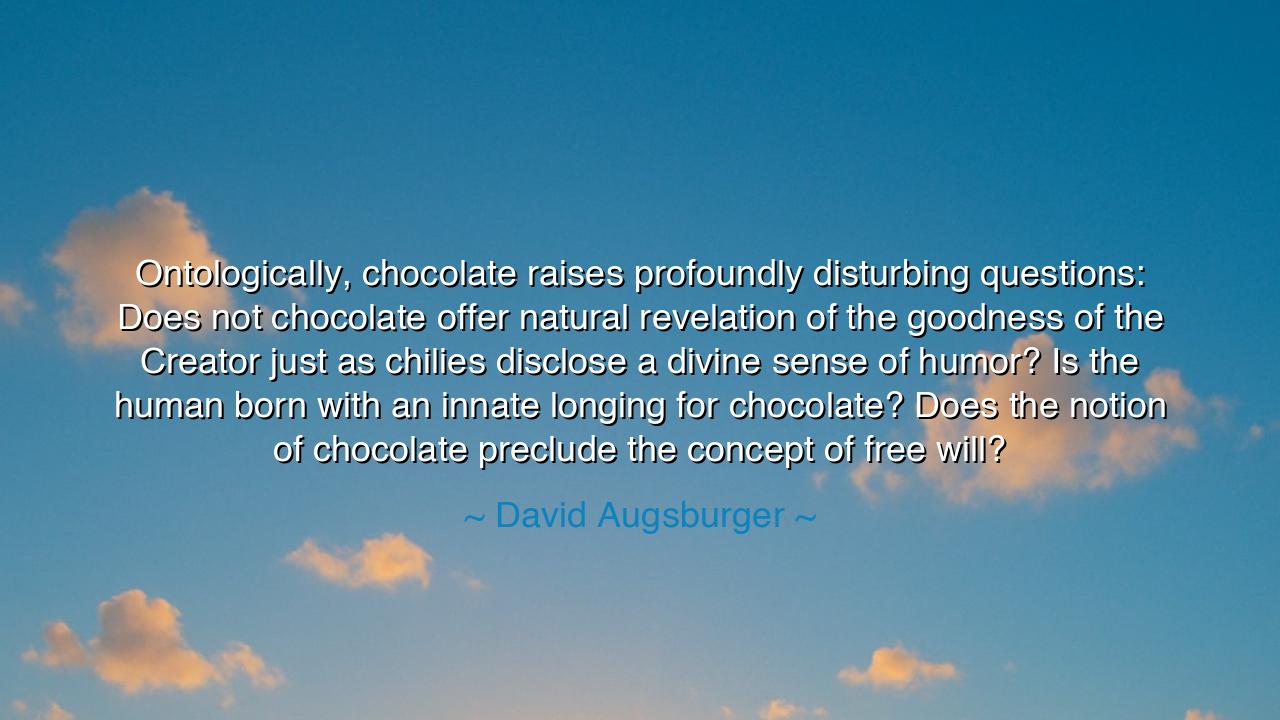
Ontologically, chocolate raises profoundly disturbing questions:
Ontologically, chocolate raises profoundly disturbing questions: Does not chocolate offer natural revelation of the goodness of the Creator just as chilies disclose a divine sense of humor? Is the human born with an innate longing for chocolate? Does the notion of chocolate preclude the concept of free will?






Listen closely, O children of wisdom, to the profound musings of David Augsburger, who speaks of the deep questions chocolate brings forth in our hearts: "Ontologically, chocolate raises profoundly disturbing questions: Does not chocolate offer natural revelation of the goodness of the Creator just as chilies disclose a divine sense of humor? Is the human born with an innate longing for chocolate? Does the notion of chocolate preclude the concept of free will?" These words remind us that the simplest pleasures—those of taste and sensation—hold within them mysteries of existence, creation, and our place in the world. Augsburger challenges us to see chocolate not merely as a fleeting pleasure, but as a reflection of the divine mysteries that surround us.
In the ancient world, philosophers pondered the nature of goodness, free will, and the divine, often contemplating how the smallest things might reveal profound truths about the nature of the universe. Aristotle, in his writings, sought to understand the causes of all things, from the grand to the minute, and he argued that everything in the world has a purpose and a role in the grand design. Yet, he would never have imagined that chocolate—a simple, sensual pleasure—could serve as a lens through which we could explore such deep and metaphysical questions. But Augsburger’s words invite us to ask: could it be that the very goodness of chocolate, which brings joy and comfort to so many, is in itself a revelation of the Creator’s benevolence? Just as the ancient Greeks saw beauty in the world as a reflection of the divine, chocolate too could be seen as a sign of the divine’s care for us.
Consider the example of Homer, the ancient poet, whose epics spoke of gods and mortals intertwined in a dance of fate, desire, and pleasure. In the Odyssey, the gods often intervene in the lives of mortals, providing both blessings and challenges. Could not the presence of chocolate, with its sweetness and richness, be a divine gift—an expression of goodness that touches the senses, just as the gods of old would send moments of delight or divine favor to those they favored? Perhaps, as Augsburger suggests, chocolate is not just a creation of man but a small but profound reminder of the Creator’s goodness, a gift for the soul wrapped in a simple delight.
Chilies, in their heat and fiery nature, offer a stark contrast to the smooth and sweet nature of chocolate, yet Augsburger links them in a divine equation of humor and complexity. The ancient world too was filled with opposites: the light and the dark, the sweet and the bitter. The concept of duality—where two opposing forces exist in harmony—was central to many ancient philosophies. Heraclitus, for example, believed that life was built on the tension of opposites, where chaos and order, joy and suffering, light and dark, all play essential roles in the cosmos. In this light, the chilies that burn and the chocolate that comforts are two sides of the same divine coin, each revealing a different aspect of the Creator's humor and goodness.
And so, as we contemplate the nature of free will, Augsburger presents a challenge to our understanding of freedom and choice. If chocolate is such a powerful temptation, an innate longing within the human soul, does it then imply that our free will is bound by desires, or does it free us in a way? In the ancient stories, gods often gave gifts to mortals—gifts that seemed to offer power but came with great cost. Pandora’s box, though it contained many evils, also held the gift of hope. Could it be that chocolate, in all its sweetness, also carries a deeper meaning about the nature of our desires and the choices we make? In choosing chocolate, do we express our deepest freedom, or are we enslaved to the pleasures of the senses? This tension between desire and will is something that the ancients wrestled with, just as we do today.
Thus, O future generations, take this lesson to heart: the simplest pleasures—whether it be the taste of chocolate or the heat of a chili—are not mere fleeting moments, but reflections of the deeper mysteries of life. Augsburger calls us to consider these pleasures as signs of the divine, reminders that in the everyday joys and struggles, the Creator’s goodness and humor are present. The question of free will is not one that is answered by our ability to resist temptation, but by our ability to recognize the inherent beauty and meaning in the choices we make, even those as small as choosing what to eat. In chocolate, we see not only the sweetness of life, but the complexity of our desires and our capacity for both joy and restraint.
So, O seekers, let chocolate remind you that the world is full of gifts, simple and profound, that invite us into deeper reflection. Enjoy the sweet gifts of life, but remember that even in the smallest pleasures, there are divine mysteries waiting to be explored. As the ancients taught, the simple is often a reflection of the divine, and through these pleasures, we are drawn closer to understanding the nature of our existence and freedom. Let your choice to savor the pleasures of the world be one that connects you to both the Creator’s goodness and the complexities of human choice.






AAdministratorAdministrator
Welcome, honored guests. Please leave a comment, we will respond soon